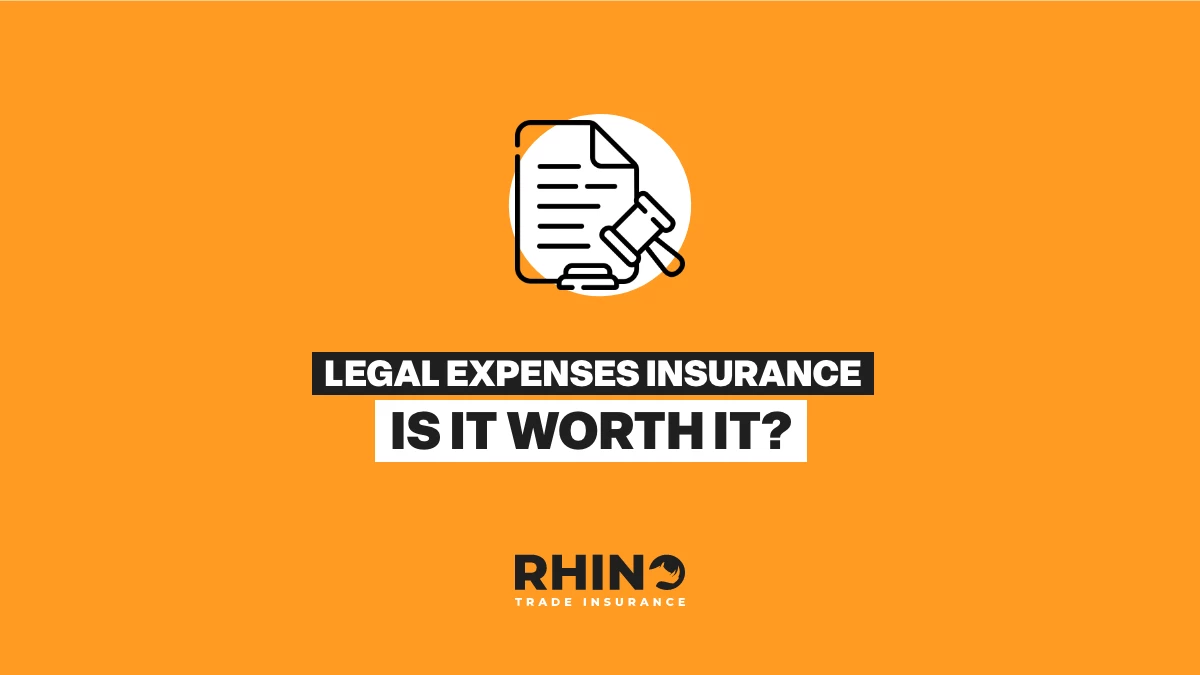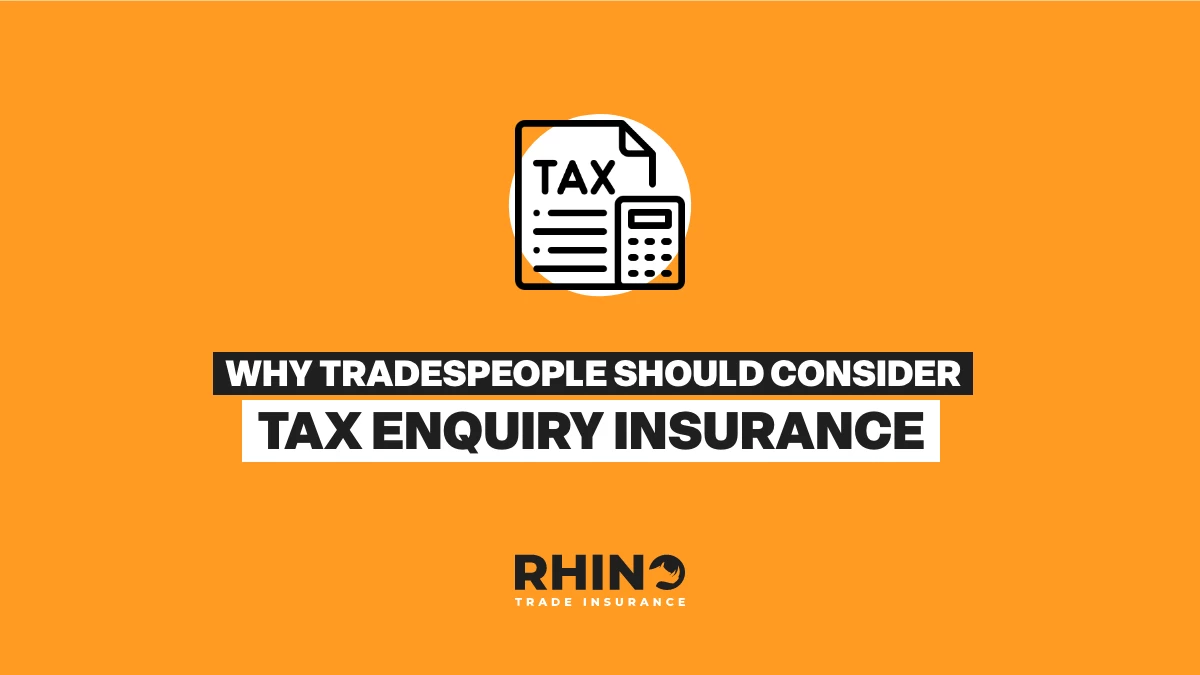
Legal Expenses Insurance – Is it Worth It?
Legal Expenses Insurance for tradespeople explained—what it covers, when you might need it, and how it protects against costly legal fees.
When the time comes that you're ready to take on the world and create your own trade business, the start may be the most exciting but testing time. Let's imagine you're a fully-fledged, time-served tradesman or woman who is ready to launch their business. This moment comes with various points you must be aware of. Getting your set-up and organisation right is vital, and ensuring you know all about regulations, the law and legislation will see you have your back covered.
Today, Rhino Trade Insurance wants to share some key areas you need to know and consider when setting up your business. Building the practical side of your business is one thing, but taking care of these important points is another.
Prior to launching your business, you will need to create the right business structure for your circumstances. This can impact various situations, like how much tax you pay, who owns the company, what insurance is needed and more. You may wonder how to decide this. Well, the main business types include the following:
Sole Trader / Self-Employed Tradesperson
If you decide to be a sole trader, you will run your business and own it yourself. This is self-employment; you are your own boss. This will mean you need to find work to stay busy, handle the finances, complete admin and more. Unless you take on a sub-contractor, you are likely a one-person band.
Due to tax reasons, every sole trader must register as a business with HMRC. You must file a self-assessment tax return when earning more than £1,000 a year. Operating as a sole trader is challenging but is the most common way to start life as a business owner.
Limited Company
Limited companies are slightly different in that you can choose to set up a private or public entity. One is traded openly with shares, and the other keeps its finances under wraps.
When setting up a limited trade company, you need to register with Companies House UK. You do this so that you can work and trade as a legal entity with directors and shareholders. A company of this nature will own assets, have profits and liabilities, and any directors will be employees of the company. If you go out of business, none of the finances will fall upon you personally, saving you from risk.
The difference from sole traders is that you have liability for any debts the company has up to the value of your shares. A sole trade will cross personal and business assets (often found to be the same thing). If you go out of business, your personal assets are at risk as a sole trader.
Partnership
Partnerships are similar to sole traders; only they would be described as having two or more people running a business. In a partnership, the owners will share all responsibilities equally. This will include any debts owed, profit and losses. Regarding their tax situation, owners will pay individual taxes and national insurance for the profit they take home.
Partnerships are more lenient when it comes to the legalities as you don't have to complete a corporate tax return. On top, the more positives include the ability to invest more capital, experience and time. This is due to you having an equal share with others, having the ability to pool expertise and raising any concerns and stresses among the owners, ultimately providing a better service to customers.
Limited Liability Partnership
A limited liability partnership is similar to a limited company only that has one or more partners running the limited business. Again, your personal and company lives are separate, so business assets are protected, and your liability is limited. Partners in this business set-up have equal responsibility when it comes to filing annual accounts.
In a limited liability partnership, directors aren't responsible for debts and legal issues due to their belonging to the business. This is opposite to a partnership in the previous paragraph. Rounding up, each partner/ director will be in charge of filing their personal taxes.
Having the right level of cover will help you run your business safely and effectively, knowing that you are protected if something goes wrong. The industry you work in is highly dangerous and carries plenty of risks. Insurance is there to give you, your customers and your suppliers the protection they need should the worst happen.
Having insurance also helps you to meet any legal responsibilities, such as having employees will mean that you legally have to insure your business with Employers' Liability Insurance. Alongside this (although it's not a legal requirement), Public Liability Insurance is the bedrock of all trade insurance policies. No tradesman or woman is worth their salt without this cover. It protects against damages caused on-site or injury inflicted on a customer/ member of the public. It even goes as far as protecting against accidental death.
On top of these crucial pieces of protection, trade businesses can explore ToolInsurance, Accident Insurance, Legal, Tax and Gadget Protection, and more to ensure your business lives to fight another day should a claim be made.
Regarding laws surrounding your trade business, you need to follow the rules set for employment and tax. When hiring people, you need to pay at least the minimum wage, provide holidays, ensure the workplace is safe, provide payslips and more. On top of these points, staff in the UK are entitled to pension schemes and statutory sick pay. When drawing up a legal employment contract, all of these points should be stated, so the employee understands the conditions they are signing up for.
Likewise, business tax is a priority; otherwise, you will get into big trouble if you don't sort it. Income tax, VAT, corporation tax, national insurance and more need to be taken care of at the end of each financial year as a trade business. Your best bet is to hire a good bookkeeper or accountant to deal with your business's financial minefield.
Find out more about the legal considerations for your business here.
When starting your business, you must create contracts for every deal you make. Whether with a client, supplier or third party, this will ensure you are legally covered and the agreement is written in black and white. Contracts can include anything, but the most common trade business information will consist of payment/ invoice dates, insurance policies, material costs, dates and timings of a project and what service is being provided.
Always get signatures for any contracts you make as you could jeopardise your business financially due to a contract dispute with no signature attached. Essentially, arrangements protect both you and the second party's backs.
We hope you enjoyed this article. If you are exploring ways to set up a trade business, be sure to follow these steps and don't avoid any. In regards to business insurance, you won't find a better place than Rhino Trade Insurance. Our team creates awesome, bespoke policies that fit your needs. We can protect your business from a variety of areas, all at an excellent price.
Give our five-star team a call today to discuss your policy. Or, simply contact us and get a price. It won't take more than a couple of minutes.
Legal Expenses Insurance for tradespeople explained—what it covers, when you might need it, and how it protects against costly legal fees.
Worried about a tax investigation? With HMRC cracking down in 2025, Tax Enquiry Insurance from Rhino gives UK tradespeople expert protection and peace of mind.
Rhino Trade Insurance CEO Troy Stevens joins industry leaders at the House of Commons to discuss the rising issue of tool theft—highlighting its impact on UK tradespeople and the importance of awareness and protection.
Tell us your trade and get a tailored insurance quote for your business in seconds
Our team of experts are available to talk to Mon-Fri 08.30-17.30 and Sat 10.00-14.00

